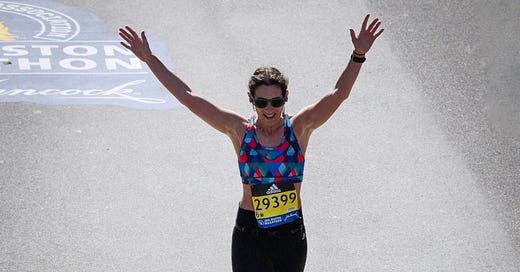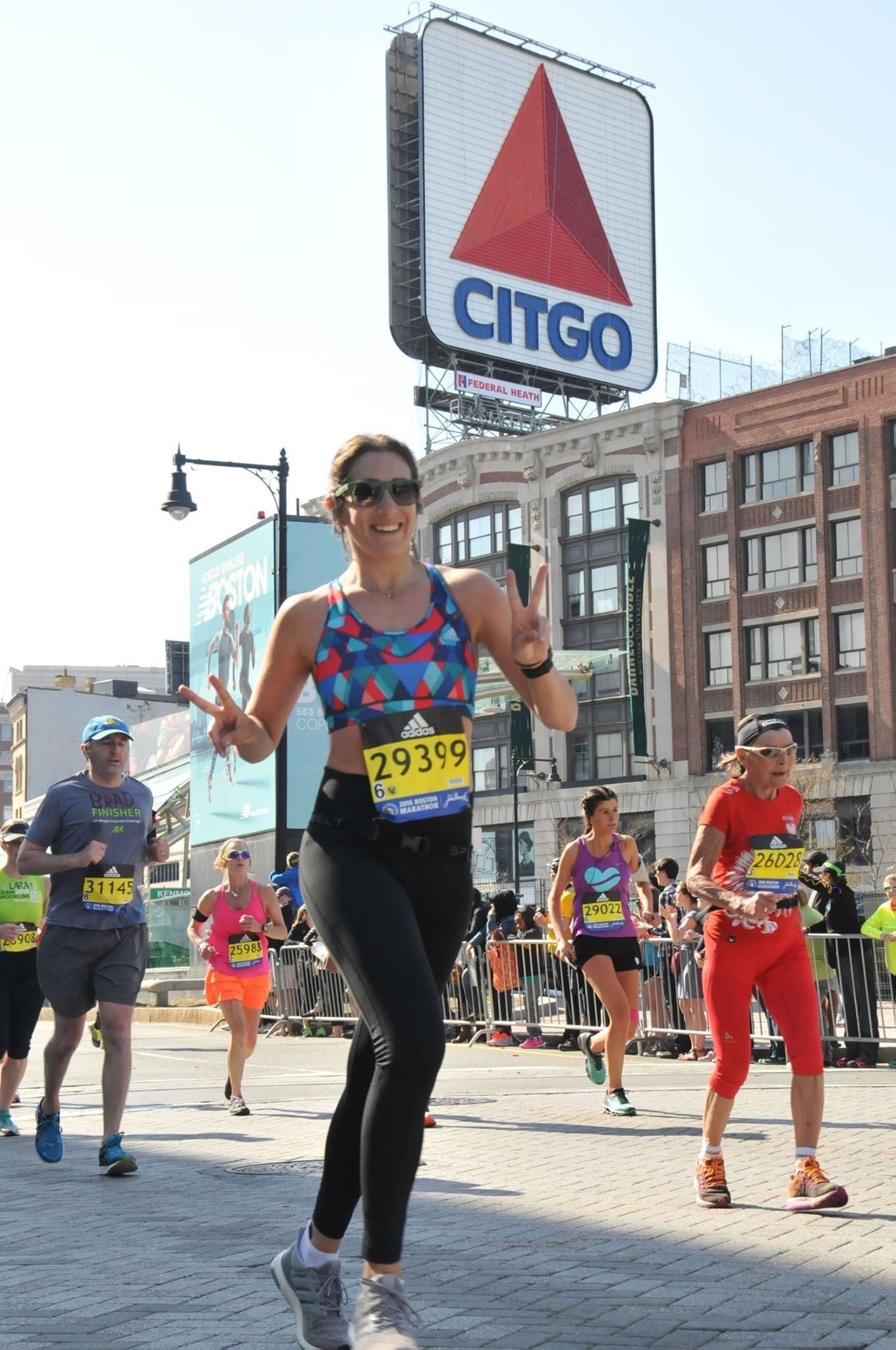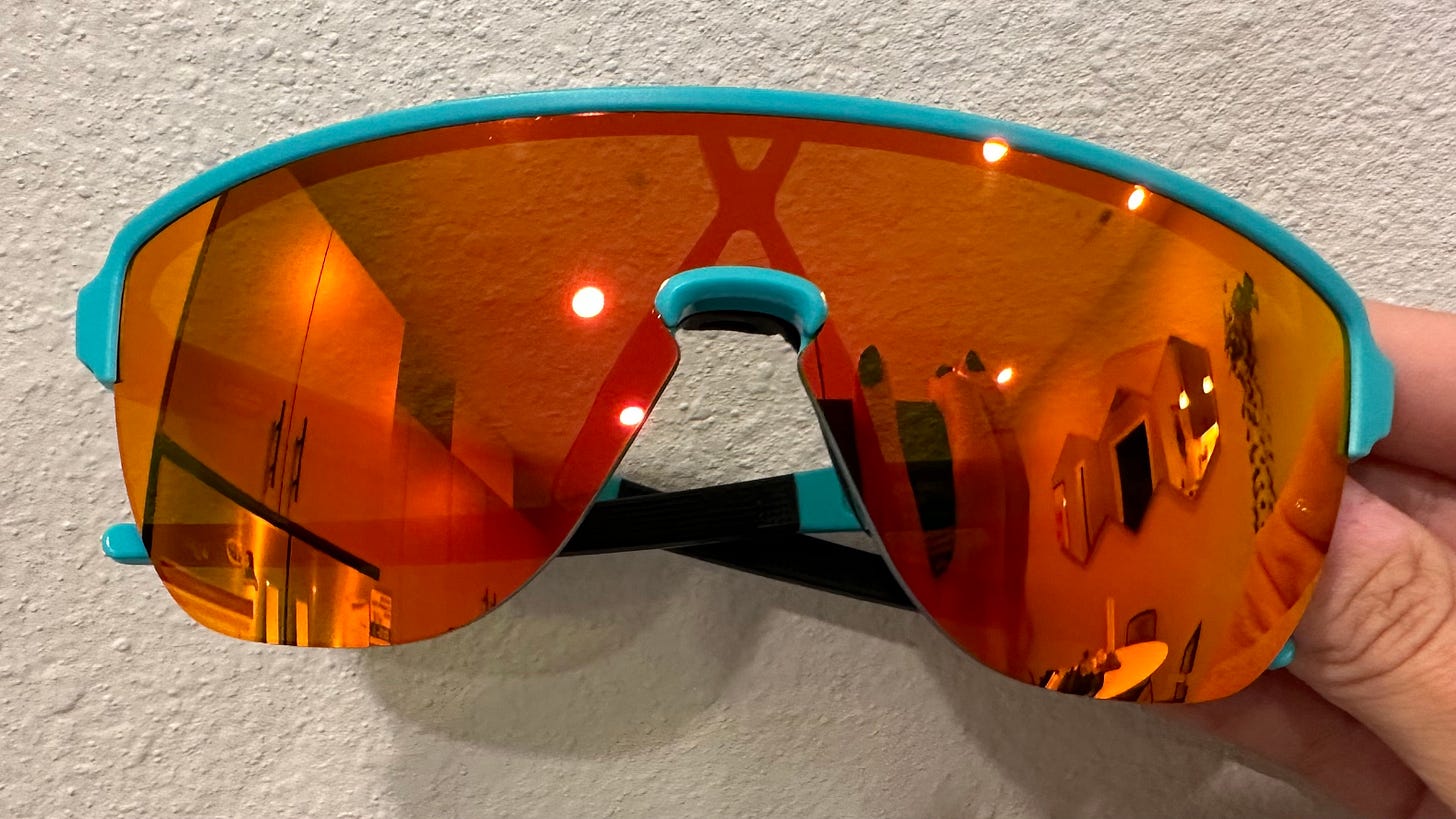I Said I'd Never Run a Marathon—Here's Why I Did
Running wasn't something I ever thought I'd enjoy. And then I ran Boston.
With the 127th Boston Marathon less than a week away (I’ll be there as a spectator!), I wanted to share an essay I wrote about my experience running Boston in 2016. I was working at Shape magazine (where this essay was published) at the time and Adidas, the title sponsor of the race, invited me to run with them. This is a kind of hilarious (to me) snapshot of what I thought about running (and my relationship with it) a mere seven years ago.
A lot of people are hesitant to call themselves runners. They're not fast enough, they'll say; they don't run far enough. I used to agree. I thought runners were born that way, and as someone who never really ran unless I had to, it seemed running for exercise (or—gasp!—fun) just wasn't in my DNA.
But I do think I'm wired to seek out challenges, and I function best under pressure. As much as I enjoyed my ClassPass membership, I was burnt out on hopping from studio to studio with no real end goal in mind. So in mid-April 2015, I signed up for a 10K. I'd never run more than three miles in my entire life (and those were sloooow miles at that), so attempting to double my distance by the first weekend of June felt pretty major. And I did it! It wasn't pretty—race day was stupid hot, my feet hurt, I wanted to walk, and I thought I might throw up at the end. But I felt proud that I had set this goal and followed through.
I didn't stop there. I set my sights on a half marathon in October. During that race, the friend I was running with told me she thought I could handle a marathon next. I laughed, and said, sure—but just because I could doesn't mean I want to.
I didn't want to because I didn't consider myself a runner. And if I didn't feel like a runner, how could I push myself to run for that long or that freakin' far? Sure, I ran, but runners I knew chose to do it in their free time solely because they enjoyed it. Running is not fun to me. OK, that's not to say I never have fun while I run. But that's not why I do it. I run because it's one of the few ways I can find some solitary peace in a city of over eight million people. At the same time, it's helped me find a group of friends who motivate me when I can't motivate myself. I run because it's helped keep a lid on chronic depression; because it's an outlet for the stress that builds up during the work week. I run because I can always go faster, stronger, longer. And I love how I feel every time I contemplate a speed or time I haven't done before and crush it.
After that race, I kept running. And sometime between finishing my second half marathon in November and squeezing in a final run for 2015 on New Year's Eve, I realized that not only had I started looking forward to my runs, I was craving them.
In January, I was getting antsy without a specific goal to work toward. Then I was offered the chance to run the Boston Marathon. The Boston Marathon is the only marathon I was ever interested in—especially before I actually started running. I went to college in Boston. For three years, I celebrated Marathon Monday sitting on a raised grate on Beacon Street, cheering on runners with my sorority sisters. Back then, I never, ever thought I'd be on the other side of the barricade. When I signed up, I wasn't even sure if I could make it to the finish line. But the Boston Marathon is a part of my history, and this would give me a chance to be a part of the race's history too. I had to at least give it a shot.
I took my training seriously—I was a total newb getting a chance to run one of the country's most prestigous races, and I didn't want to eff it up. That meant squeezing in post-work runs as late as 8:30 p.m. (because not even marathon training could turn me into a morning exerciser), giving up drinking on Friday nights if I didn't want to suffer from seriously unpleasant stomach issues during my Saturday long runs, and sacrificing up to four hours of potential brunch time on said Saturdays (that suuuucked). There were short runs when my legs felt like lead, long runs where I cramped every mile. My feet looked gnarly, and I chafed in places one should never chafe. There were times when I wanted to quit one mile into a run, and times when I wanted to skip my run completely.
But despite all that, I was actually enjoying the process. I wouldn't use the "F" word, but every mile I added to my long runs and every second I shaved off my speed runs meant I was logging new PRs on the reg, which was pretty awesome. Who doesn't love that feeling of accomplishment? So when I was having an off day, I refused to flake out. I didn't want to let myself down—not in the moment, and not on race day.
I don't know when it clicked for me; there wasn't an "aha!" moment. But I am a runner. I became a runner a long time ago, back when I first laced up my sneakers and decided to run—even if I didn't realize it then. If you run, you're a runner. Simple as that. It still isn't fun for me, but it's so much more. It's empowering, exhausting, challenging, miserable, exhilarating—sometimes all within one mile.
I never thought I'd run 26.2 miles. I didn't even think I could. But when I stopped worrying about what made me a runner and just focused on actually running, I surprised myself with what I was really capable of. I'm running a marathon because I didn't think I could, and I wanted to prove myself wrong. I finished it to show other people they shouldn't be afraid to start. Hey, it might even be fun.
Spoiler alert: I have a lot of fun running now. So much so, I’ve run 13 marathons. And I’ve started coaching other runners who want to have more fun with the sport. Some people finish a marathon, check it off their bucket list, and move on. Other people, like me, finish a marathon and think, “I can do that better.” And here we are!
the rundown
Oakley Corridor Sunglasses
Oakley claims that “never in our history have we created something special” just for runners—which I personally disagree with strongly. Their frames and shades may not be specifically designed for runners, but if you have ever seen a photo of me running, you know that Oakley (starting with the Frogskins and continuing with the Sutros) has been my go-to brand for marathon glasses from day one. That said, the brand-new Corridor is a fun, semi-rimless, aviator-esque design that will appeal to people who want a slightly less aggressive shield style. They’ve got all of Oakley’s signature sports features—namely Prizm Lens Technology, lightweight O Matter frame material, Unobtainium ear socks and nosepad—but they’re not quite as light as the Sutros I prefer. I’ll definitely wear these in training, and stick with my faves on race day.
“Myth-Busting Wellness Hacks: Cold Plunges, Caffeine, Alcohol, and Fitness Trackers,” Plain English with Derek Thompson
This podcast, featuring Brad Stulberg and Steve Magness, was a great dive into some of the fitness fads that have been generating headlines recently. You can listen to it for the specifics, but the overall theme of looking past the topline science (i.e. the social media hook) to the functional impact of something really resonated with me. No matter how many highly hyped recovery gadgets and performance gear I cover, I always find myself coming back to the same takeaway: there’s no magic cure that replaces consistent exercise, proper nutrition, and enough rest. And, as the podcast goes into, life is about more than optimization—obsessive over the micros can cause us to lose sight of the macros. Case in point: Yes, alcohol is bad for you, but the social benefits of having a drink or two with friends can offset the negatives.
OOFOS OOmg Sport
Now that boot season is over (fingers crossed, Denver), I’ve been wearing what OOFOS calls its athlete-inspired Active Recovery shoe any time I’m not in sneakers. It kind of reminds me of old-school Keds, if Keds had a foundation of super comfy foam and a four-way stretch upper. I like OOFOS’ sandals a lot from a comfort perspective, but those still have clunky, orthopedic vibes; these slip-ons are actually stylish enough to wear out with jeans and feel so much better when I’m walking around post-run than my standard lifestyle sneakers.
The Runners Changing Course on Uniform Expectations
I don’t spend too much time thinking about “buns” or hot pants or even three-inch running shorts, because I am never, ever going to wear them. But this New York Times article (I’m linking to a free version) was an interesting look at how running uniforms have evolved—meaning, “uniforms for women grow smaller and tighter as they ascend from high school to college to professional running, while men’s uniforms typically remain suspended in the high-school look: a loose jersey and flowing shorts or knee-length spandex for sprinters”—and how that evolution is starting to shift. You know the itty-bitty uniform has nothing to do with performance; as Lauren Fleshman said in her book (and Kara Goucher repeated on her podcast), “If a bikini bottom was the fastest thing and there was research to show that, the men would be wearing bikini bottoms.” So, until we see Kipchoge shirtless and in briefs breaking sub-2:00 on an official marathon course, wear what you want.










2016 Ashley was already a great writer but didn't have a clue that running was going to change her life.
Thanks for this post Ashley. I've always been an athlete of other sports (football, rugby, track sprinter), but was always apprehensive about calling myself a runner. I'm a big, heavy guy who happens to enjoy running and articles like this help me declare, "I am a runner." Keep up the great work!